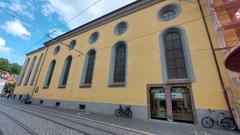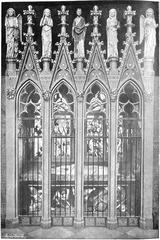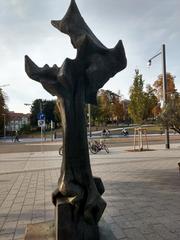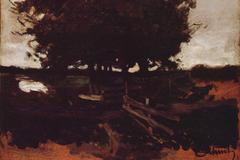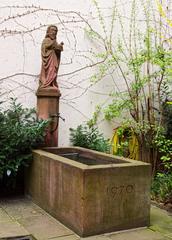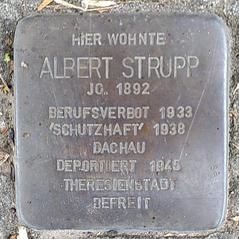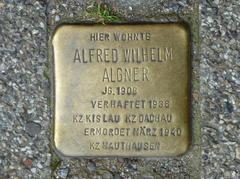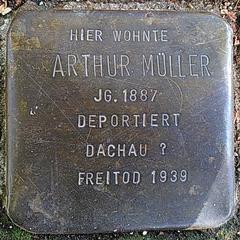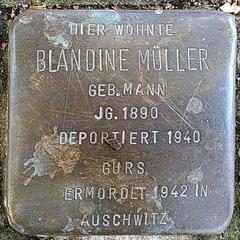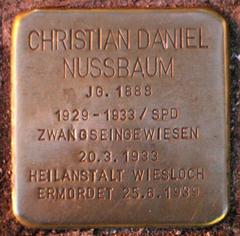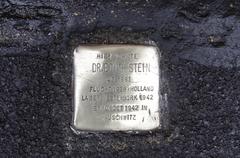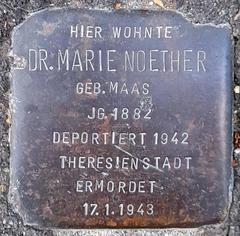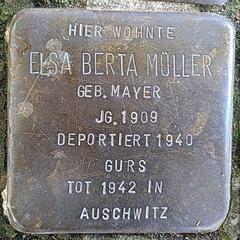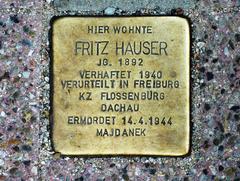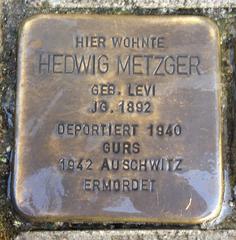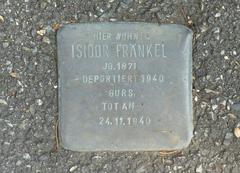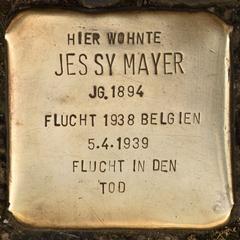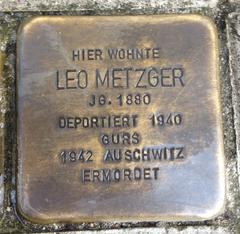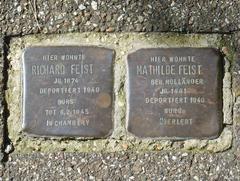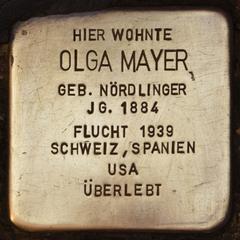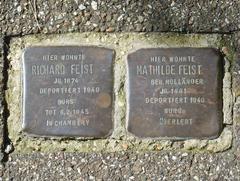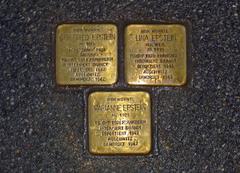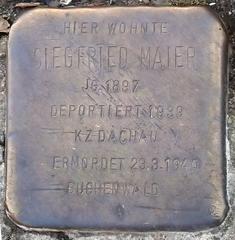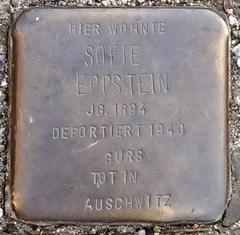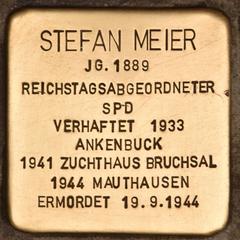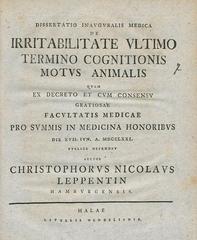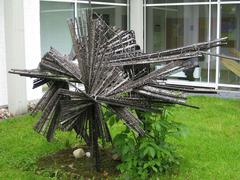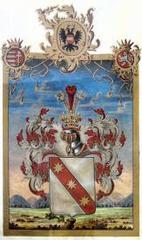Unvergessene Heimat Freiburg im Breisgau: Visiting Hours, Tickets, and Travel Guide
Date: 14/06/2025
Introduction
Nestled within the historic cityscape of Freiburg im Breisgau, Germany, the Unvergessene Heimat Memorial stands as a solemn testament to the forced expulsion of millions of ethnic Germans from Eastern and Central Europe after World War II. Honoring the suffering, resilience, and cultural contributions of these displaced persons, the memorial serves as a focal point of remembrance and dialogue. Whether located at the symbolic Fahnenbergplatz in the city center or within the tranquil grounds of the Hauptfriedhof (Main Cemetery), Unvergessene Heimat offers visitors a contemplative space to reflect on themes of memory, identity, and reconciliation (Bund der Vertriebenen; Alemannische Seiten).
Freiburg itself, with its rich medieval heritage and history of resilience, became a new home for many expellees, whose integration profoundly influenced the city’s demographic and cultural landscape. The memorial’s evocative design—marked by inscriptions and symbolic stonework—connects visitors to this turbulent past while inviting exploration of contemporary meanings of “Heimat” (homeland) and displacement (Tablet Magazine; Britannica).
This guide provides comprehensive details on visiting hours, ticketing, accessibility, and travel tips, as well as insights on nearby historical sites such as the Freiburg Münster cathedral, Augustiner Museum, and Stolpersteine memorials. Whether you are a history enthusiast, a cultural traveler, or a reflective visitor, this article will help you plan a respectful and enriching visit to Unvergessene Heimat and explore the broader historical fabric of Freiburg (Visit Freiburg; Europe for Visitors).
Origins and Historical Context
The Forced Expulsions After World War II
The “Unvergessene Heimat” memorial is a poignant reminder of the mass displacement of an estimated 12 to 15 million ethnic Germans from regions such as the Sudetenland, Silesia, East Prussia, and areas of present-day Poland, the Czech Republic, Hungary, and Romania between 1944 and 1950 (Bund der Vertriebenen). This forced migration, sanctioned by postwar treaties and policies, resulted in immense suffering, loss, and the uprooting of entire communities.
Freiburg’s Role as a New Home
Situated at Fahnenbergplatz in central Freiburg, the memorial’s location is symbolically significant (Alemannische Seiten). After World War II, Freiburg itself was heavily damaged, yet the city became a haven for expellees and refugees, whose integration helped shape its modern identity.
Symbolism and Design
The Unvergessene Heimat memorial features evocative design elements, including inscriptions and sculptural forms, that symbolize suffering, loss, and the enduring connection to homeland. The inscription “Unvergessene Heimat” is accompanied by plaques listing the expelled regions, grounding the memorial in historical context and universalizing the experience of forced migration (Tablet Magazine).
Historical Significance in Freiburg
Freiburg’s Rich History
Founded in 1120, Freiburg has endured wars, occupations, and significant destruction, particularly during World War II (Britannica; Europe for Visitors). The city’s postwar reconstruction and subsequent integration of expellees marked a transformative chapter in its history.
Impact of Expellees
The arrival of expellees after 1945 significantly altered Freiburg’s social and cultural landscape. Their traditions, dialects, and experiences became woven into the city’s evolving identity, and the memorial honors both their losses and their contributions to Freiburg’s renewal.
The Expulsions: Facts and Figures
The forced migration, initiated by the Potsdam Conference in 1945, displaced millions and resulted in up to 2 million deaths through violence, disease, and deprivation (Bund der Vertriebenen). The Bund der Vertriebenen continues to advocate for remembrance and the rights of expellees, organizing annual commemorative events.
Cultural and Social Impact
Unvergessene Heimat is more than a site of mourning; it fosters dialogue about identity, belonging, and the meaning of “Heimat.” Educational programs, public ceremonies, and resources for intergenerational remembrance give the memorial contemporary relevance, especially as Europe faces new displacement crises (Bund der Vertriebenen).
Commemoration and Contemporary Relevance
Annual events, particularly the “Tag der Heimat,” feature speeches, wreath-laying, and community participation. The upcoming 80th anniversary of WWII’s end in 2025 will underscore the call to “Remember – Preserve – Shape,” emphasizing the importance of historical reflection and peace (Bund der Vertriebenen).
Visiting Unvergessene Heimat: Practical Information
Location
The memorial is found at Fahnenbergplatz in the city center as well as within the Hauptfriedhof (Main Cemetery) at Berliner Allee 63, 79108 Freiburg im Breisgau. Both locations are accessible by public transport, foot, or bicycle, and are close to other historical sites.
Visiting Hours
- Fahnenbergplatz Memorial: Open year-round, 24/7.
- Hauptfriedhof Memorial: Open daily from dawn until dusk; seasonal variations may apply.
Tickets and Admission
- No entrance fee at either location; donations for upkeep are welcome.
Accessibility
- Both sites are wheelchair accessible, with paved paths and ramps.
- Public transport: Take tram line 4 (direction Zähringen) to “Hauptfriedhof” or use city center stops for Fahnenbergplatz.
- Parking is available near the Hauptfriedhof; Old Town parking is limited, so public transport is recommended.
Amenities
- Restrooms are available at Hauptfriedhof.
- Cafés, shops, and restaurants are nearby in the city center.
- Multilingual information panels and brochures are available; English is widely spoken among staff.
Travel Tips
- Best times to visit: Early morning or late afternoon for a tranquil experience.
- Dress respectfully as the memorial is within or near cemetery grounds.
- Photography: Allowed for personal use; avoid photographing mourners or ceremonies.
- Guided tours: Available through the Freiburg tourist office or local agencies, often in English and German.
- Sustainability: Use public transport or cycling to support Freiburg’s environmental initiatives.
Integrating Unvergessene Heimat into Your Freiburg Itinerary
Plan a visit as part of a walking tour of Freiburg’s Old Town, including:
- Freiburg Münster – Iconic Gothic cathedral (Visit Freiburg)
- Augustiner Museum – Art and cultural history
- Colombischlössle Archaeological Museum – From prehistory to medieval times
- Stolpersteine – Brass plaques commemorating Nazi victims
- Martinstor and Schwabentor – Medieval gates
Allow 60–90 minutes for Unvergessene Heimat, and up to a full day to explore adjacent sites. For refreshments, visit the Markthalle or cafés around Münsterplatz.
Frequently Asked Questions (FAQ)
Q: What are the visiting hours?
A: Fahnenbergplatz is open 24/7; Hauptfriedhof is open dawn to dusk, year-round.
Q: Is there an entrance fee?
A: No, admission is free.
Q: Is the memorial accessible for visitors with disabilities?
A: Yes, both sites are wheelchair accessible.
Q: Are guided tours available?
A: Yes, in German and English. Contact the tourist office for schedules.
Q: Can I take photographs?
A: Yes, but avoid flash and respect privacy.
Q: How do I reach the memorial by public transport?
A: Tram line 4 to “Hauptfriedhof” or city center stops for Fahnenbergplatz.
Visiting Freiburg Münster: Essential Guide
Visiting Hours and Tickets
- Hours: 9:00 AM–6:00 PM daily (check for holiday variations).
- Entry: Free to main area; tower access €4 for adults.
- Guided Tours: Offered in English and German; book in advance.
Cultural and Ethical Considerations
- Dress modestly (shoulders/knees covered).
- Photography: Allowed without flash; respect restrictions during services.
- Behavior: Maintain silence; avoid eating/drinking inside.
Accessibility
- Ramps and assistance available; some areas may be challenging due to historic architecture.
Sustainability
- Use public transport or bicycles; recycle where possible (IBN Battuta Travel).
Practical Tips
- Language: German is primary, but English is widely spoken.
- Safety: Freiburg is safe; remain aware in crowds.
- Nearby attractions: Augustiner Museum, Historical Merchants’ Hall, Schlossberg hill.
Summary and Final Tips
The Unvergessene Heimat Memorial encapsulates the profound human consequences of forced migrations and commemorates the resilience of displaced communities. Its evocative symbolism, accessible location, and integration into Freiburg’s rich tapestry of historical sites make it a must-visit for anyone seeking to understand the city’s—and Europe’s—modern identity (Bund der Vertriebenen; Alemannische Seiten). With practical amenities, free or low-cost admission, and inclusive programming, the memorial is accessible and meaningful for a diverse audience. As significant anniversaries approach, Unvergessene Heimat continues to invite reflection and a commitment to peace and remembrance (Visit Freiburg; Tablet Magazine).
Practical Information
- Address: Fahnenbergplatz (city center) and Berliner Allee 63, 79108 Freiburg im Breisgau (Hauptfriedhof)
- Opening Hours: Fahnenbergplatz – 24/7; Hauptfriedhof – dawn to dusk, year-round
- Admission: Free (donations welcome)
- Contact: Freiburg tourist office or Hauptfriedhof administration
Further Reading and References
- Bund der Vertriebenen
- Alemannische Seiten
- Tablet Magazine
- Britannica
- Europe for Visitors
- Visit Freiburg
For more information, updates, and guided tours, download the Audiala app and follow us on social media.
